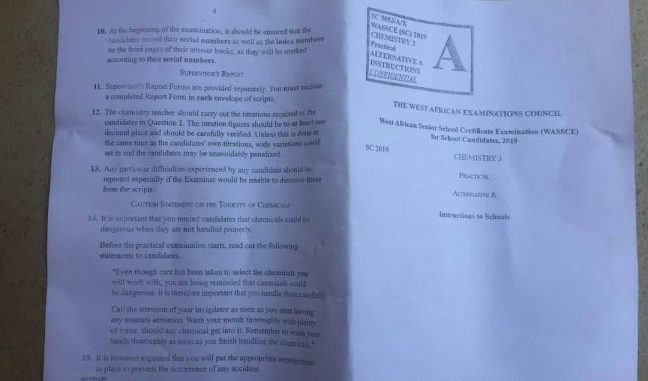
2019 WAEC CHEMISTRY PRACTICAL QUESTIONS AND ANSWERS NOW AVAILABLE
VERY IMPORTANT MESSAGE:
Please make sure you use your school end point in that number 1. In my answer, you will see that i used 12.50cm3. Make sure you use what your school used. So try edit my 12.50cm3 and put yours, then recalculate. Meaning that you should replace my 12.50cm3 with your school’s end point anywhere you see it on my work. Some school got 12.90cm3, 13.00cm3, some even got 18.50cm3, etc
MORE EXPLANATION:
You should use ur school average titre value in number 1a bcos each school have their general titre value for their students which should differ a little with their fellow classmates due to errors encountered during titration in the lab. So when you see 12.50cm3, you should check the range ur school got during the titration in the lab, ur chemistry teacher must have taught how to input ur values and he/she must have given you an average titre value. So, use it to edit our solution. Some school got 13.00cm3, 12.90cm3, 15.50cm3, etc. You should edit and recalculate the Number 1bii by editing our 12.50 there with ur school value. But if ur school, got ranges like 12.30cm3-12.70cm3, then u can use my 12.50cm3. Its difference is always +- 0.2… Just take note. This is applicable in number 1a and 1bii.
Thanks
===========================================
(1a)
DRAW A TABLE WITH THE FOLLOWING
Burette reading|ROUGH|1st |2nd |3rd
Final |13.60|15.50|14.80|12.50
Initial |1.00 |3.10 |2.40 |0.00
Vol. acid used |12.60|12.60|12.40|12.50
Volume of S2O3²- =12.60+12.40+12.50/3
=37.50/3
=12.50cm³
(1bi)
Conc. in g/dm³ = molar mass * conc in mol/dm³
But molar mass of Na2S2O3
=(23*2)+(32*2)+(16*3)
=46 + 64 + 48
=158g/mol
Therefore 15.8g/dm³ = 158g/mol * conc of A in mol/dm³
Conc of A in mol/dm³ = 15.8/158
=0.1mol/dm³
(1bii)
Using CaVa/CbVb = na/nb
0.1*12.50/Cb * 25.00 = 2/1
50Cb = 1.25
Cb = 1.25/50
Cb = 0.025mol/dm³
The conc of I2 in B = 0.025mol/dm³
(1biii)
Gram conc of I2 = molar mass * molar conc
= (127*2)*0.025
=6.35g/dm³
Percentage mass of I2 in sample = 6.35/9.0 *100%
= 0.7056 * 100%
=70.56%
(1c)
There have to be a change in the colour of the mixture before it is added. The end point is known when the blue colour formed as starch is added, changes to colourless
===========================
NOTE: DRAW TABLE HERE, TEST comes first, OBSERVATION follows, then INFERENCE, just like in the paperwork below
(2)
PLS DRAW A TABLE FOR THESE:
TEST|OBSERVATION | INFERENCE
(2a)
TEST: Salt C+10cm^3 of distilled water and shake with filter
OBSERVATION: Salt C dissolves partly in water to give colourless filerate and residue
INFERENCE: Salt C contains both soluble and insoluble salts
(2bi)
TEST: 2cm^3 of filterate of salt C +AgNO3(aq) then dil HNO3
OBSERVATION: Formation of white ppt then the white ppt remains
INFERENCE: Cl- or CO3^2- present
(2bii)
TEST: Solution from 2bi + NH3(aq) in excess
OBSERVATION: The white ppt formed in 2bi dissolves in NH3(aq)
INFERENCE: Cl- confirmed
(2ci)
TEST: Residue of C + 2cm^3 of dil HCl then shake
OBSERVATION: Effervescence occurs with the liberation of a gas that is odourless and colourless but turns lime water milky and turns moist blue litmus paper to red
INFERENCE: Acidic gas is evolved ie CO2 is evolved from CO3^2- or HCO3-
(2cii)
TEST: Mixture from 2ci +NH3(aq) in drops then in excess
OBSERVATION: Blue gelatinous ppt is formed in drops which turns deep blue colouration in excess
INFERENCE: Cu^2+present, Cu^2+ confirmed
=================
(3ai)
On adding BaCl2 solutions to a portion of saturated Na2CO3 precipitate is formed,precipitate dissolves on adding excess dilute HCl
(3aii)
Q is reducing agent like SO2, H2S, CO
(3bi)
calcium oxide(CaO)
(3bii)
concentrated H2SO4
(3c)
NaOH pellet is deliquescent because it absorb moisture from the atmosphere to form solution

Leave a Reply